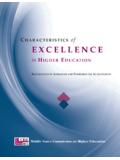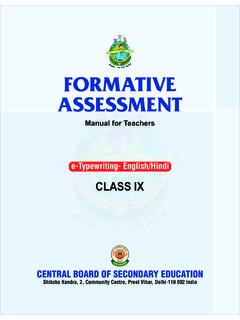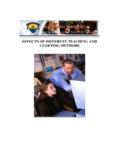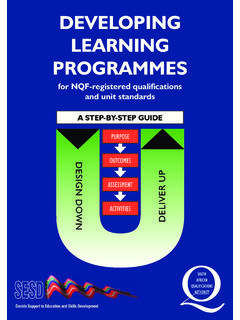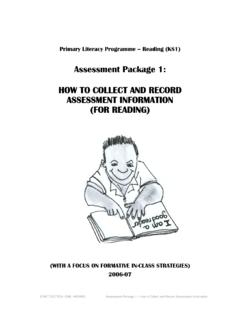Transcription of STUDENT LEARNING ASSESSMENT - msche.org
1 STUDENT . LEARNING . ASSESSMENT . Options and Resources Middle States Commission on Higher Education STUDENT . LEARNING . ASSESSMENT . Options and Resources SECOND EDITION. Published by the Middle States Commission on Higher Education 3624 Market Street Philadelphia, PA 19104. Telephone: 267-284-5000. Fax: 215-662-5501. 2007, Copyright by the Middle States Commission on Higher Education Second Edition All rights reserved. First Edition, 2003: This publication replaces Framework for Outcomes ASSESSMENT (1996) and Outcomes ASSESSMENT Plans: Guidelines for Developing ASSESSMENT Plans at Colleges and Universities (1998).
2 Second Edition, 2007: The publication Assessing STUDENT LEARNING and Institutional Effectiveness: Understanding Middle States Expectations (2005) replaces Chapter 4 in the First Edition. Reprinted August 2008 with typographical error corrections. Permission is granted to colleges and universities within the jurisdiction of the Middle States Commission on Higher Education to photocopy these guidelines for the purpose of institutional self-study and continuing institutional improvement. Bound copies may be purchased through the publications order form, which is available on the Commission's website at Printed in the United States of America ii Contents Acknowledgements.
3 V Introduction .. 1. How Accreditation Helps, Accreditation Standards; Purpose and Scope of this Handbook; Guiding Principles; The Organization of this Handbook; and MSCHE. Website Resources 1. Motivating and Involving Campus Communities .. 5. Partners in Teaching and LEARNING ; and Leading ASSESSMENT Initiatives 2. LEARNING Goals .. 10. Benefits of Clearly Articulated LEARNING Goals; Relationship among LEARNING Goals at All Levels; First Steps Towards Developing LEARNING Goals; Defining LEARNING Goals before Selecting ASSESSMENT Methods; Ensuring the Quality and Relevance of LEARNING Goal Statements; and Resources for Creating STUDENT LEARNING Goal Statements 3.
4 Evaluating STUDENT LEARNING .. 27. Formative and Summative ASSESSMENT ; Benchmarking; Direct and Indirect Methods for Assessing STUDENT LEARNING ; Quantitative vs. Qualitative Evidence; Other Methodological Considerations; Key Questions When Choosing ASSESSMENT Instruments; Easy-to-Implement Tools and Techniques; and Other ASSESSMENT Tools 4. Understanding Middle States Expectations for Assessing STUDENT LEARNING and Institutional Effectiveness .. 54. What is the ASSESSMENT of Institutional Effectiveness (Standard 7)? What is the ASSESSMENT of STUDENT LEARNING (Standard 14)? Why does the Commission Expect STUDENT LEARNING and Institutional Effectiveness to be Assessed?
5 What are the Characteristics of ASSESSMENT Processes that Meet Middle States Expectations? What Should Institutions Document Regarding ASSESSMENT ? How Should This Information be Organized and Formatted for Review by the Commission and Its Representatives? How are the Documentation of Institutional ASSESSMENT and STUDENT LEARNING ASSESSMENT Related? What Might the Commission and Its Representatives Look For in ASSESSMENT Documentation? 5. Using Results to Improve Teaching and LEARNING .. 59. Institutional Support Strategies Designed to Encourage the Use of ASSESSMENT Results; Translating ASSESSMENT Results into Better LEARNING ; and A Message to Faculty: The Interconnectedness of ASSESSMENT , Teaching, and LEARNING .
6 Iii Appendices: 1. ASSESSMENT Standards in Characteristics of Excellence in Higher Education .. 75. 2. Enhancing the Campus Climate for ASSESSMENT : Questions for Academic Leaders .. 84. 3. ASSESSMENT Practices Quiz .. 86. 4. Key to ASSESSMENT Practices Quiz .. 87. 5. Department/Program STUDENT Outcomes Survey .. 88. 6. LEARNING Goals and ASSESSMENT Techniques .. 91. 7. From Effect to Cause: A Brainstorming Exercise.. 92. 8. STUDENT LEARNING Styles: Frequently Asked Questions .. 93. References .. 97. List of Figures 1. Relationship between Institutional and Program Goals .. 13. 2. Relationship between Program and Course Goals.
7 14. 3. Leading Questions for Developing LEARNING Goals .. 22. 4. Teaching Goals Inventory .. 23. 5. Examples of Direct and Indirect Measures of STUDENT LEARNING (Course, Program, and Institutional Levels) .. 29. 6. Criteria-based Rating Scales (Rubrics) .. 43. 7. Excerpt from a Simple Rating Scale .. 44. 8. Example of a Detailed Rating Scale .. 46. 9. Example of a Holistic Scoring Guide (For Critical Thinking).. 48. 10. STUDENT Self-reflection Questions for a Course or Program .. 49. 11. Example of a Test Blueprint .. 50. 12. Commonly-administered Measures of Critical Thinking .. 52. 13.
8 Considerations when Deciding to Use Portfolios .. 53. 14. Using ASSESSMENT Results at the Institutional Level: Maintaining Mission and Achieving Vision .. 64. 15. Using ASSESSMENT Results at the Program Level: Preparing Students for Future Success .. 66. 16. Using ASSESSMENT Results at the Course Level: Ensuring LEARNING .. 68. 17. Strategies to Improve STUDENT LEARNING .. 71. iv Acknowledgements The Middle States Commission on Higher Education is grateful for the assistance of its 2001 Advisory Panel on STUDENT LEARNING and ASSESSMENT for developing the basic text for this publication, with additional contributions by the Commission, its staff, and some colleagues in higher education.
9 The Advisory Panel on STUDENT LEARNING and ASSESSMENT [Positions as of Date Appointed: June 2001]. Dr. Peter J. Gray (Chair), Associate Director, Center for Support of Teaching and LEARNING , Syracuse University Dr. Michael J. Dooris, Director, Planning Research & ASSESSMENT , The Pennsylvania State University Dr. Thomas V. Fernandez, Professor of Physics, Nassau Community College Dr. Bruce Keith, Assistant Dean for Academic ASSESSMENT , United States Military Academy Dr. Armand S. LaPotin, Professor of History and Academic Program Coordinator, SUNY College at Oneonta Dr. Elizabeth Larsen, Professor, Coordinator of General Education, West Chester University of Pennsylvania Dr.
10 Jodi H. Levine, Assistant Vice Provost for University Studies, Temple University Dr. Rosalyn Lindner, Senior Advisor to Provost for ASSESSMENT , SUNY College at Buffalo Dr. Peter J. Miller, Assistant Professor, Department of Physical Therapy, University of the Sciences in Philadelphia Dr. Paula E. Peinovich, Vice President for Academic Affairs, Excelsior College Ms. Linda A. Suskie, Director of ASSESSMENT , Towson University; Former MSCHE Fellow Dr. Barbara E. Walvoord, Director, Kaneb Center for Teaching and LEARNING ; Concurrent Professor of English;. and Fellow, Institute for Educational Initiatives, University of Notre Dame Prof.

